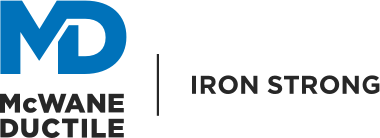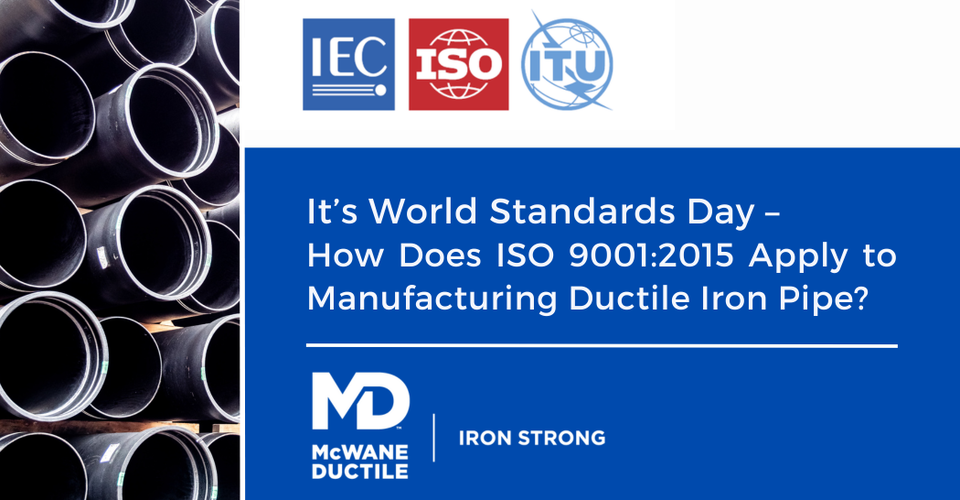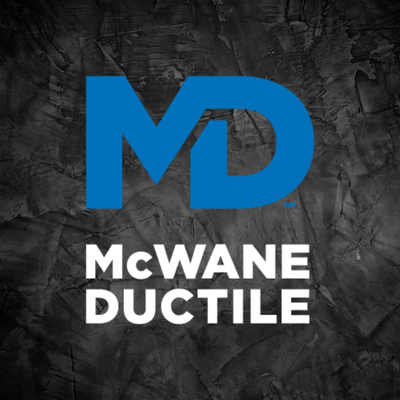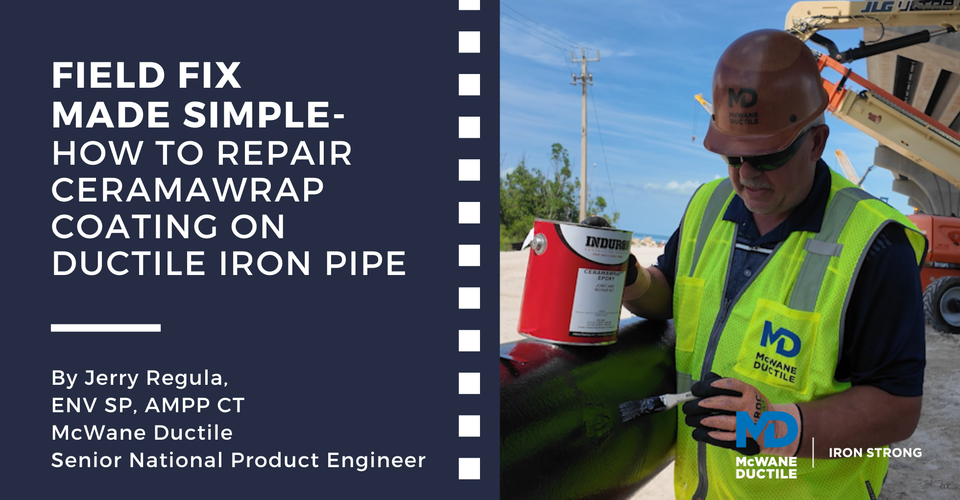Did you know October 14 is World Standards Day? At McWane Ductile, standards matter—because they matter to everyday life. International standards play a critical role in consumer safety, environmental protection, technological advancement, and economic growth.
In this #IronStrong blog, we explore why standardization is essential for manufacturing Ductile Iron (DI) products and what it means for the people and communities that rely on them. With insights from Hal Eddings, Technical Director at McWane Ductile, and Jeremy Stewart, Quality Assurance Manager at McWane Ductile–Utah, the discussion highlights how rigorous standards help ensure quality, reliability, and long-term performance for consumers.

What is World Standards Day?
This day draws attention to the importance of standardization in the global economy among consumers, regulators, and industry. It is a collaborative initiative of the International Electrotechnical Commission (IEC), the International Organization for Standardization (ISO), and the International Telecommunication Union (ITU). This day also pays tribute to the collaborative efforts of thousands of experts worldwide who develop voluntary and common technical agreements published as International Standards.
How do standards relate to our everyday lives?
For example, whether you’re a stay-at-home mom, a doctor, or a water worker, that means the diapers and formula you purchase for your child, the tools you use to tend to patients, or the pipe you install for critical water infrastructure are consistently manufactured, and delivered following high-quality standards in the same manner, every time.
What Is the importance of standards developed by ISO specifically?
ISO is the world's largest developer of voluntary international standards using global consensus. Their standards aim to break down barriers to international trade. Some well-known measures include ISO 9001 (quality), ISO 14001 (environment), and ISO 27001 (information security management). Their standards offer solutions and best practices for almost all types of technology and business, helping companies and organizations increase performance while protecting consumers and the planet.
What are the ISO 9001:2015 Key Requirements, and how do they relate to manufacturing DI Pipe?
Another way to ask this is, “What are we doing to protect your million-dollar investment?” Said Hal Eddings. “We’re utilizing ISO 9001:2015 to meet customer needs and demonstrate compliance consistently. To attain ISO 9001:2015 certification, organizations, including Ductile iron pipe manufacturers, must fulfill the following key requirements:
- Context of the Organization
- Leadership and Commitment
- Planning
- Support
- Operation
- Performance Evaluation
- Improvement
In other words, we must identify factors that impact our Quality Management System (QMS) and determine the scope of the system with leadership and commitment from top management. We must establish clear quality objectives and a plan to achieve them while considering risks and opportunities.
We provide adequate resources, personnel, and a suitable work environment to support the QMS to meet customer requirements and produce conforming products. We must monitor, measure, and perform self-audits of our records daily.
It’s not just an audit of the people’s training and manufacturing procedures; it’s an audit of the overall quality management process. If employees continue to experience non-conformances, we must critically examine the process to address where corrective action to the QMS must be taken,” said Eddings.
What is the significance of an ISO 9001:2015 (ISO) Certification in manufacturing Ductile Iron pipe?
DI pipe manufacturers are subject to various national and international standards and regulations. ISO emphasizes a process-based approach, ensuring robust processes for quality control at every production stage and making it easier for companies to demonstrate compliance during audits and inspections.
The standards focus on risk-based thinking, encouraging organizations to identify potential risks in their processes. By proactively addressing these risks, DI pipe manufacturers can avoid costly defects and ensure smoother operations and fewer customer complaints.
By placing customer focus at the core of the QMS, ISO helps DI pipe manufacturers better understand customer needs and expectations. ISO can streamline processes, reduce waste, and optimize productivity, leading to cost savings for manufacturers and, in turn, potentially more competitive pricing for customers. Meeting these requirements increases customer satisfaction, repeat business, and positive word-of-mouth referrals.
ISO is globally recognized and respected. Certification enhances DI pipe manufacturers' reputation, making accessing markets where ISO compliance is a prerequisite for doing business easier. Continuous improvement encourages DI pipe manufacturers to innovate and keep up with evolving customer needs and industry trends. This drive for improvement ensures long-term sustainability and growth.
Adherence to many standards is necessary, including ISO
Although McWane Ductile adheres to numerous quality standards such as AWWA (American Water Works Association), ANSI (American National Standards Institute), NSF (Public Health and Safety Organization), and UL (Underwriter’s Laboratories), and more, we are also a Certified ISO 9001:2015 Manufacturer. This standard sets a framework for organizations to:
- establish and maintain a robust quality management system (QMS)
- to enhance customer satisfaction, improve processes,
- and ensure consistent product quality.
“In manufacturing Ductile iron pipes, adhering to the ISO 9001:2015 standard is crucial for achieving efficiency, reliability, and compliance with global quality norms,” said Eddings.
Why Did McWane Ductile Choose to Pursue an ISO 9001:2015 Certification?
The ISO 9001 standards are established on the notion that a systematic quality assurance program delivers assurance in an organization's products or services and the management team. Before implementing ISO in the late 1990s and early 2000s, McWane Ductile was experiencing a rash of non-conformances.
Upper Management approached our team with concerns that sales were dropping due to these non-conformances. They were driven to find a better system to improve and streamline processes, reduce costs, document procedures, satisfy our customers, and sustain the business. After thorough research, we opted to implement the ISO 9001 Standard.
McWane Ductile Utah earned its initial ISO 9001 Certification in June of 1998, while McWane Ductile Ohio earned the same certification in January of 1999, with McWane Ductile New Jersey following shortly thereafter.
Zero non-conformances and being ISO Certified is like getting an A+ on your final college exam. We are very proud of our achievements over the past 20 years. This program has created greater employee engagement. By improving internal communications, we can ensure everyone works toward the same agenda. Involving employees in designing process improvements makes them more satisfied and productive. Now, we can effectively meet our customers’ and other stakeholders' needs through this standard.
How does ISO 9001:2015 apply to McWane Ductile?
“When implementing ISO, I recall Jeff Otterstedt, EVP, McWane Ductile, wanted a means to track causes for defective products, create higher standards, and increase repeatability. This was critical. ISO increased our operating efficiency by focusing on industry best practices and quality. Leveraging the reputation of ISO 9001:2015 helped win more vendors and contracts,” said Jeremy Stewart.
ISO 9001:2015 follows a high-level structure that aligns with other ISO management system standards, allowing easier integration. The standard is founded on the following seven quality management principles:
1 – Customer focus
2 – Leadership
3 – Engagement of people
4 – Process approach
5 – Improvement
6 – Evidence-based decision making
7 – Relationship management
“ISO allows a company to reduce errors, increase profits, and motivate and engage staff with a more efficient internal process because the staff document, write, review, and update the procedures themselves. That’s the beauty of the ISO standard. It does not focus specifically on making sticks of pipes themselves but on the organization as a whole. Quality leadership starts at the top and trends through the entire foundry.
The Utah Foundry will be undergoing its recertification for ISO 9001:2015 near the end of this month to assess whether our facility’s ISO requirements are effectively implemented, if we conform to the standards, and if we maintain those standards.
With ISO, we must say what we do and then do what we say, which boils down to repeatability, fewer errors, improved operational performance, and increased profits. With improved decision-making, you can detect and identify problems in good time, which means you can quickly take steps to avoid the same mistakes,” said Stewart.
Conclusion
On this World Standards Day, we recognize ISO 9001:2015 as a vital standard for organizations, especially those manufacturing Ductile iron pipes. By implementing a Quality Management System that aligns with the principles and requirements of ISO, manufacturers can enhance product quality, comply with industry standards, and improve customer satisfaction.
Additionally, emphasizing risk management, continual improvement, and efficient resource utilization ensures long-term success and competitiveness in the global market. Achieving this certification demonstrates a commitment to excellence and positions Ductile iron pipe manufacturers as reliable, high-quality, and environmentally conscious entities in the waterworks industry.
Want to Know More About ISO or have questions regarding your waterworks project?
To learn more about the initiatives of World Standards Day, visit WorldStandardsDay.org. If you have any questions regarding ISO 9001:2015 or your waterworks project, contact your local McWane Ductile representative. We have team members who've managed small and large water utility systems, served in engineering consulting firms, and brought decades of experience solving field issues involving pipeline construction and operation. From design to submittal to installation, we strive to educate and assist water professionals throughout the water and wastewater industry.







